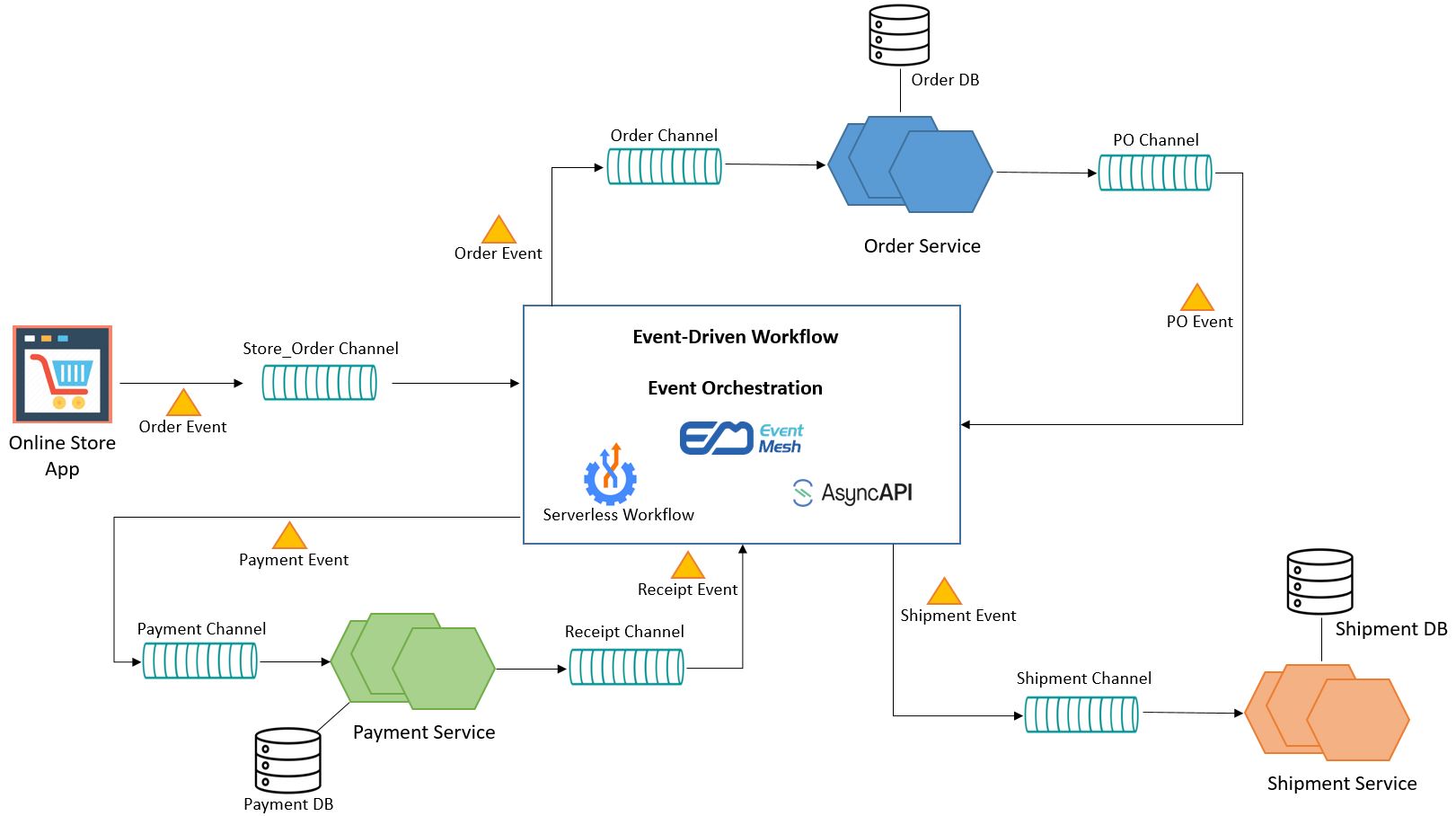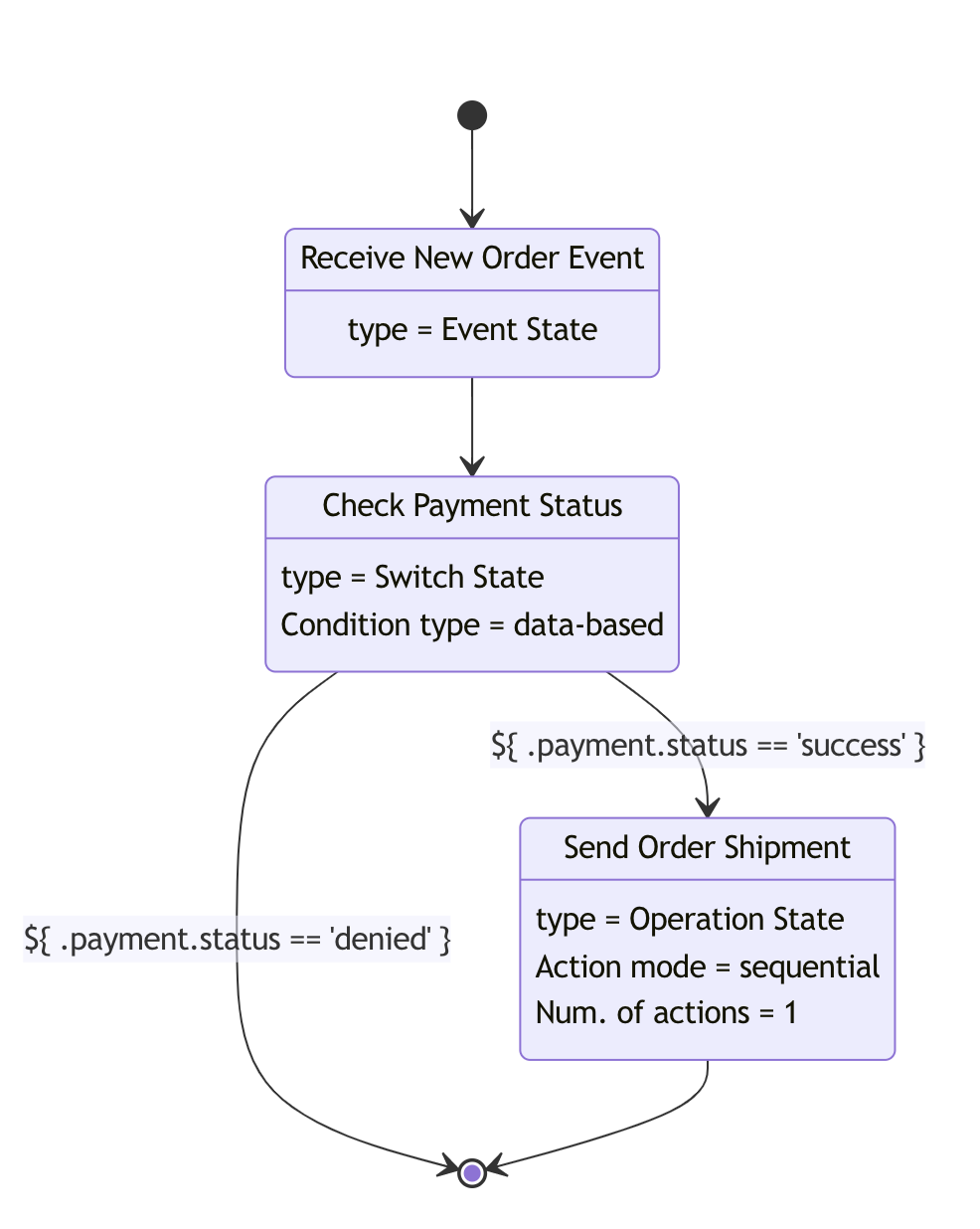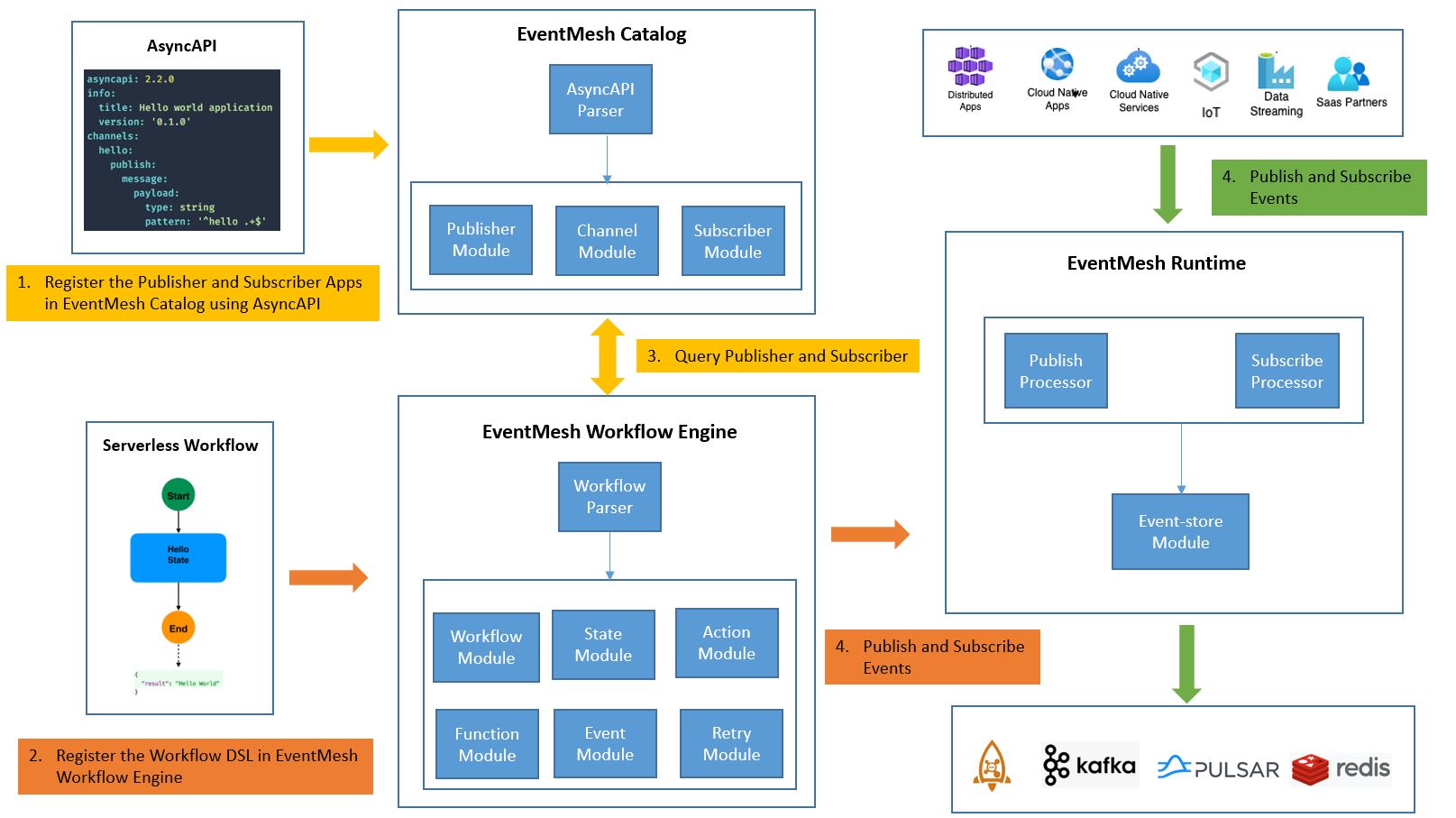EventMesh工作流
业务场景
图中你正在构建一个简单的电商订单管理系统,系统能够接收和调配新的订单,调配流程需要处理所有的订单创建,付款处理以及发货处理。
为了实现高可用和高性能,你可以使用事件驱动架构(EDA)构建微服务应用去处理商店前端,订单管理,支付处理和发货管理。你可以在云上部署整个系统。要处理高并发,你可以利用消息系统缓冲,并扩展多个微服务实例。架构类似于:

当每个微服务都在自己的事件通道上运行时,EventMesh在执行事件编排方面发挥着至关重要的作用。
我们使用 CNCF Serverless工作流 来描述此事件工作流编排。
CNCF Serverless工作流
CNCF Serverless工作流定义了一个厂商中立、开源和完全社区驱动的生态系统,用于定义和运行针对Serverless技术领域的基于DSL的工作流。
Serverless工作流定义了一种领域特定语言(DSL)来描述有状态和无状态的基于工作流的serverless函数和微服务编排。
详见官方github
EventMesh工作流
我们利用Serverless工作流DSL来描述EventMesh工作流。根据其规范,工作流由一系列用于描述控制流逻辑的工作流状态组成。目前,我们仅支持与事件相关的工作流状态。请参见工作流DSL设计中支持的状态。
工作流状态可以包含通用的操作,或在工作流执行期间应调用的服务/函数。这些操作可以引用可复用的函数定义(应如何调用这些函数/服务),还可以引用触发基于事件的服务调用的事件,以及要等待的事件,这些事件表示这种基于事件的服务调用完成。
在EDA解决方案中,我们通常使用AsyncAPI定义事件驱动的微服务。Serverless工作流“函数”定义支持使用AsyncAPI定义调用语义。有关详细信息,请参见Using Funtions for AsyncAPI Service。
AsyncAPI
AsyncAPI是一项开源计划,旨在改善事件驱动体系结构(EDA)的当前状态。我们的长期目标是让使用EDA和使用REST API一样容易。包括从文档到代码生成、发现到事件管理。现在应用于REST API的大多数流程也适用于事件驱动/异步API。
工作流示例
在本示例中,我们构建了上面订单管理系统的事件驱动工作流。
首先,我们需要为我们的微服务应用定义AsyncAPI。
- 在线商店应用程序
asyncapi: 2.2.0
info:
title: Online Store application
version: '0.1.0'
channels:
store/order:
subscribe:
operationId: newStoreOrder
message:
$ref : '#/components/NewOrder'
- 订单服务
asyncapi: 2.2.0
info:
title: Order Service
version: '0.1.0'
channels:
order/inbound:
publish:
operationId: sendOrder
message:
$ref : '#/components/Order'
order/outbound:
subscribe:
operationId: processedOrder
message:
$ref : '#/components/Order'
- 支付服务
asyncapi: 2.2.0
info:
title: Payment Service
version: '0.1.0'
channels:
payment/inbound:
publish:
operationId: sendPayment
message:
$ref : '#/components/OrderPayment'
payment/outbound:
subscribe:
operationId: paymentReceipt
message:
$ref : '#/components/OrderPayment'
- 物流服务
asyncapi: 2.2.0
info:
title: Shipment Service
version: '0.1.0'
channels:
shipment/inbound:
publish:
operationId: sendShipment
message:
$ref : '#/components/OrderShipment'
接下来,定义描述订单管理业务逻辑的订单工作流。
id: storeorderworkflow
version: '1.0'
specVersion: '0.8'
name: Store Order Management Workflow
states:
- name: Receive New Order Event
type: event
onEvents:
- eventRefs:
- NewOrderEvent
actions:
- eventRef:
triggerEventRef: OrderServiceSendEvent
resultEventRef: OrderServiceResultEvent
- eventRef:
triggerEventRef: PaymentServiceSendEvent
resultEventRef: PaymentServiceResultEvent
transition: Check Payment Status
- name: Check Payment Status
type: switch
dataConditions:
- name: Payment Successfull
condition: "${ .payment.status == 'success' }"
transition: Send Order Shipment
- name: Payment Denied
condition: "${ .payment.status == 'denied' }"
end: true
defaultCondition:
end: true
- name: Send Order Shipment
type: operation
actions:
- eventRef:
triggerEventRef: ShipmentServiceSendEvent
end: true
events:
- name: NewOrderEvent
source: file://onlineStoreApp.yaml#newStoreOrder
type: asyncapi
kind: consumed
- name: OrderServiceSendEvent
source: file://orderService.yaml#sendOrder
type: asyncapi
kind: produced
- name: OrderServiceResultEvent
source: file://orderService.yaml#processedOrder
type: asyncapi
kind: consumed
- name: PaymentServiceSendEvent
source: file://paymentService.yaml#sendPayment
type: asyncapi
kind: produced
- name: PaymentServiceResultEvent
source: file://paymentService.yaml#paymentReceipt
type: asyncapi
kind: consumed
- name: ShipmentServiceSendEvent
source: file://shipmentService.yaml#sendShipment
type: asyncapi
kind: produced
对应的工作流图如下:

EventMesh工作流引擎
在下面的体系结构图中, EventMesh目录, EventMesh工作流引擎 和 EventMesh Runtime在三个不同的处理器中运行。

运行工作流的步骤如下:
在环境中部署发布者和订阅者应用程序。 使用AsyncAPI描述应用程序API,生成asyncAPI yaml。 使用AsyncAPI在EventMesh目录中注册发布者和订阅者应用程序。
在EventMesh工作流引擎中注册Serverless工作流DSL。
工作流引擎从EventMesh目录查询发布服务器和订阅服务器的需要的工作流DSL
函数。事件驱动App将事件发布到EventMesh Runtime触发工作流。EventMesh工作流引擎发布和订阅事件、编排事件。
EventMesh Catalog 设计
EventMesh目录存储发布者、订阅者和通道元数据。由以下模块组成:
AsyncAPI解析器
使用AsyncAPI社区提供的SDK (tool list), 解析并验证AsyncAPI yaml输入,并生成AsyncAPI定义。
发布者, 通道, 订阅者模块
从AsyncAPI定义存储发布者、订阅者和通道信息。
EventMesh工作流引擎设计
工作流引擎由以下模块组成:
工作流解析器
使用Serverless Workflow社区提供的SDK(SDKs), 解析和验证工作流DSL输入,并生成工作流定义。
工作流模块
管理工作流实例的生命周期,从创建、启动、停止到销毁。
状态模块
管理工作流状态生命周期。支持与事件相关的状态,and the supported state list below is Work-in-Progress.
工作流状态 描述 Operation 执行Actions中定义的AsyncAPI函数 Event 检查定义的事件是否匹配,如果匹配,执行定义的AsyncAPI函数 Switch 检查事件是否与事件条件匹配,并执行定义的AsyncAPI函数 Parallel 并行执行定义的AsyncAPI函数 ForEach 迭代输入集合并执行定义的AsyncAPI函数 行为模块
管理函数中的行为。
函数模块
通过在EventMesh Runtime中创建发布者和/或订阅者来管理AsyncAPI函数,并管理发布者/订阅者生命周期。
AsyncAPI 操作 EventMesh Runtime Publish Publisher Subscribe Subscriber 事件模块
使用工作流DSL中定义的规则管理CloudEvent数据模型,包括事件过滤器、关联和转换。
重试模块
管理事件发布到EventMesh Runtime的重试逻辑。